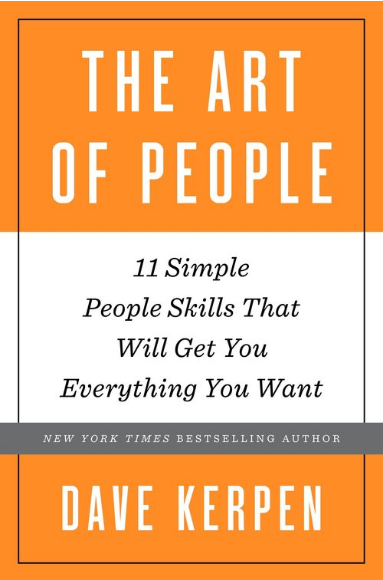Nice Guys Finish First: Dave Kerpen on the Power of People Skills

Conjure in your mind the image of an archetypal businessperson. They’re probably kind of a jerk, right? The kind of person who would do anything – and stab anyone in the back – to get ahead?
Contrary to our received wisdom, being a heartless sleazebag isn’t going to get you very far in life. That’s according to Dave Kerpen, the CEO of Likeable Local and the author of The Art of People: 11 Simple People Skills That Will Get You Everything You Want. In fact, Kerpen believes that if you want to be successful in business today – and life in general – you need to cultivate great people skills.
Kerpen first realized this after writing his first two books, Likeable Social Media and Likeable Business.
“I realized that the principles I wrote about in those books – things like ‘listening’ and ‘authenticity’ – they don’t just apply to social media and business. They apply to all career and life skills when it comes to getting what you want,” Kerpen says. “So I wrote The Art of People to help people get what they want out of life.”
The book is divided into 11 categories of skills, and across those categories it presents 53 tips on how to put these skills into practice.
Back in April, I had the chance to speak with Kerpen about his book. What follows is a brief transcript of that conversation, minimally edited for style and clarity.
Recruiter.com: If I were to ask you, “What is this book about?”, how would you answer?
David Kerpen: I’d say It’s about how to get better at your people skills, communicate better with others, and get what you want out of life based on getting people to do things for you.
RC: One of the major ideas in the book is that the people who win in life are the people who have the best people skills – not the cutthroat competitive types. How did you reach this conclusion?

RC: Is this a recent development, something that is specific to our cultural moment? Or has it always been this way?
DK: I think it’s always been this way, but [the importance of people skills] has been magnified recently because the Internet – and social media in particular – has rendered the world smaller and more connected than ever before.
It used to be that you could get away with treating people less kindly or building a culture at your company that isn’t worth raving about. Now, people talk. People are more connected than ever before. People have always talked, but now, when you post something on LinkedIn or Facebook, word spreads a lot faster and a lot wider. That’s why people skills are more important now than ever before.
RC: The book explores a number of critical people skills. Can you give us an example of one or two?
DK: Well, it has some wider skills, like “listening,” but also some very practical tips, like “Always take the water when you’re offered water at an interview or meeting.”
RC: Interesting – why is that? Why should you always take the water?
DK: You want to put the other people at ease. Sometimes, you refuse to take the water because you don’t want to put people out, but if someone came over to your house and you offered them water, you would want them to say “Yes.” It would make you feel like a better host if they said “Yes.”
For that same reason, you should always say “Yes” when people offer you water or coffee when you meet them in a professional setting.
RC: For job seekers who might pick up this book, what’s the major takeaway?
DK: It’s not about you. It’s about the other person. In a job-seeking scenario, it’s less about selling yourself and more about understanding the other person interviewing you – what they want to accomplish and how you can help them accomplish that.
RC: Would you say that the same kind of thinking applies to recruiters?
DK: Yes. Recruiters should think less about themselves and how awesome they are, and more about the business they’re working with. What are the business’s needs and how can they help?

